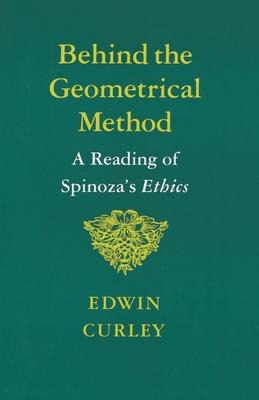This book is the fruit of twenty-five years of study of Spinoza by the editor and translator of a new and widely acclaimed edition of Spinoza's collected works. Based on three lectures delivered at the Hebrew University of Jerusalem in 1984, the work provides a useful focal point for continued discussion of the relationship between Descartes and Spinoza, while also serving as a readable and relatively brief but substantial introduction to the Ethics for students. Behind the Geometrical Method is actually two books in one. The first is Edwin Curley's text, which explains Spinoza's masterwork to readers who have little background in philosophy. This text will prove a boon to those who have tried to read the Ethics, but have been baffled by the geometrical style in which it is written. Here Professor Curley undertakes to show how the central claims of the Ethics arose out of critical reflection on the philosophies of Spinoza's two great predecessors, Descartes and Hobbes.
The second book, whose argument is conducted in the notes to the text, attempts to support further the often controversial interpretations offered in the text and to carry on a dialogue with recent commentators on Spinoza. The author aligns himself with those who interpret Spinoza naturalistically and materialistically.
Behind the Geometrical Method: A Reading of Spinoza's Ethics
This book is the fruit of twenty-five years of study of Spinoza by the editor and translator of a new and widely acclaimed edition of Spinoza's collected works. Based on three lectures delivered at the Hebrew University of Jerusalem in 1984, the work provides a useful focal point for continued discussion of the relationship between Descartes and Spinoza, while also serving as a readable and relatively brief but substantial introduction to the Ethics for students. Behind the Geometrical Method is actually two books in one. The first is Edwin Curley's text, which explains Spinoza's masterwork to readers who have little background in philosophy. This text will prove a boon to those who have tried to read the Ethics, but have been baffled by the geometrical style in which it is written. Here Professor Curley undertakes to show how the central claims of the Ethics arose out of critical reflection on the philosophies of Spinoza's two great predecessors, Descartes and Hobbes.
The second book, whose argument is conducted in the notes to the text, attempts to support further the often controversial interpretations offered in the text and to carry on a dialogue with recent commentators on Spinoza. The author aligns himself with those who interpret Spinoza naturalistically and materialistically.